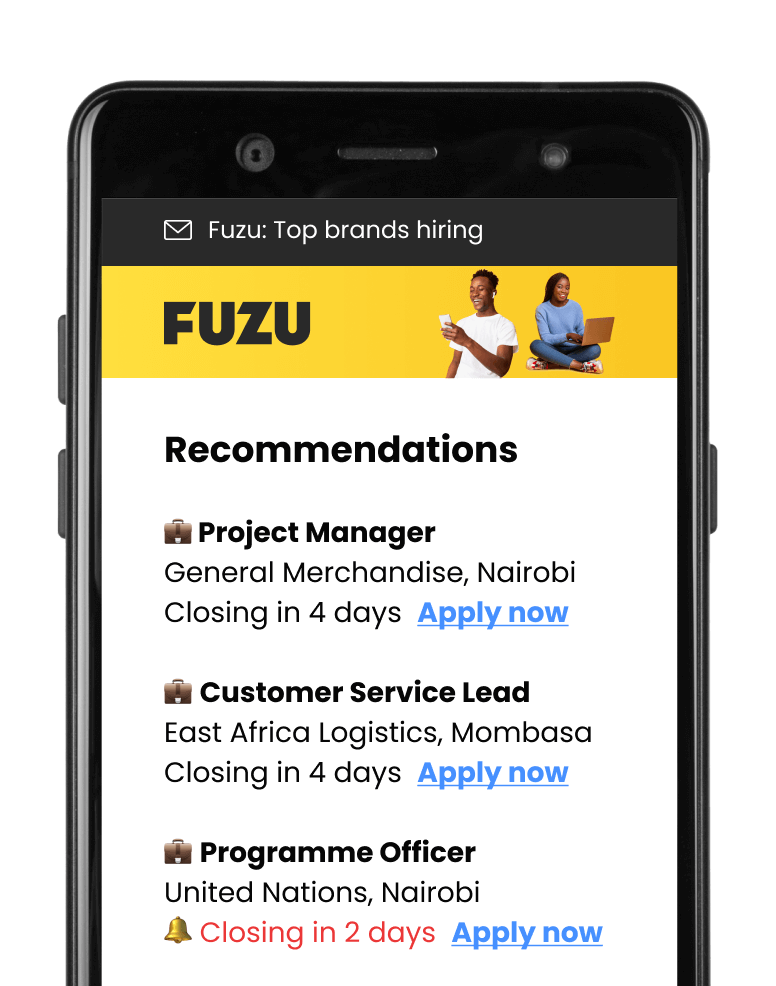Minimum Qualifications
- Master’s Degree preferably in International Development, Disaster Risk Management, International Humanitarian Law, Sustainable Development, Education, Peace and Conflict Studies, or Humanitarian Assistance.
Work Experience:
- Experience managing programs in relevant technical areas such as Protection, WPE, Food Security, International development, livelihoods, child protection, and Education.
- Possesses at least five years of field-based experience managing staff and programs, particularly in complex emergencies and insecure environments.
- Experience managing humanitarian relief and/or transitional programs in areas affected by large-scale displacements due to conflict and chronic food and nutritional insecurity.
- Hands-on experience in Donor report writing, Concept note development, and Proposal writing.
- Demonstrated experience in program management, project design, and use of project design tools.
- Demonstrated experience in supervising large teams, and in mentoring staff with a strong commitment to staff capacity development; Demonstrated qualities of leadership, sensitivity to cultural settings, communication skills, commitment, and sound judgment.
- Aptitude to adapt to a different context regarding security, culture, climate, or health issues.
- Demonstrated attention to detail, ability to follow procedures, meet deadlines, and work independently and cooperatively with team members.
- Commitment to women’s rights and IRC’s vision, mission, and values, including sensitivity to cultural settings.
Program Management, Technical Quality, and Strategy:
- Program Design and Management: Led the execution of safety outcome programs in Borno state, Nigeria, ensuring alignment with IRC's Strategic Action Plan and international best practices. Develop and implement innovative approaches tailored to the local context to maximize impact and effectiveness, with a focus on women, girls, boys, and vulnerable populations.
- Program Quality Assurance and Implementation: Oversee all aspects of program implementation to ensure the highest standards of quality and effectiveness in safety outcome programming. Conduct regular assessments against established benchmarks and adjust strategies as needed to achieve desired outcomes, prioritizing the safety and empowerment of target beneficiaries.
- Resource Allocation and Grant Management: Strategically allocate resources and manage grants to optimize the impact of safety outcome programs in Borno state. Collaborate closely with finance and grants teams to develop robust budgets and expenditure plans aligned with donor guidelines and program objectives, with a strong emphasis on serving the needs of women, girls, boys, and vulnerable populations.
- Stakeholder Engagement and Advocacy: Cultivate strong partnerships with government entities, donors, and other stakeholders to advocate for the safety and empowerment of women, girls, boys, and vulnerable populations in Borno state. Engage in strategic advocacy efforts to raise awareness of key protection issues and mobilize support for program initiatives that prioritize their needs and rights.
- Partnership Development and Capacity Building: Drive the establishment of strategic partnerships with local organizations and community structures to enhance the delivery of safety outcome programs. Provide targeted capacity-building support to partners, strengthening their ability to implement and sustain effective protection interventions that benefit women, girls, boys, and vulnerable populations.
- Team Leadership and Talent Development: Provide visionary leadership to safety program teams in Borno state, fostering a culture of excellence, innovation, and collaboration. Invest in the professional development of staff through ongoing training, coaching, and mentorship initiatives, empowering them to deliver high-quality services to women, girls, boys, and vulnerable populations.
- Reporting, Monitoring, Evaluation, and Learning (MEL): facilitates the Implementation of robust monitoring, evaluation, and learning frameworks to track the progress and impact of safety outcome programs rigorously. Utilizing data-driven insights to drive continuous improvement and innovation, ensuring programs remain responsive to evolving needs and contexts, with a strong focus on outcomes for women, girls, boys, and vulnerable populations.
- Risk Assessment and Adaptive Management: Conduct regular risk assessments to identify emerging protection risks and challenges in Borno state, proactively adjusting program strategies to mitigate potential threats. Embrace an adaptive management approach that allows for agile responses to changing circumstances, prioritizing the safety and well-being of women, girls, boys, and vulnerable populations.
- Coordination and Representation: Act as a strategic representative of IRC's safety outcome programs, actively engaging in coordination mechanisms and platforms at local, regional, and national levels. Champion the interests of women, girls, boys, and vulnerable populations in protection discussions, advocating for inclusive and gender-sensitive approaches to programming that address their unique needs and vulnerabilitiesTop of Form, and Collaborate with the other IRC Program Managers to improve on outcome area integrations. Lead the development of coordination and referral mechanisms to ensure quality access to services between the safety outcome and other sectors.
Staff Performance Management, Learning & Development:
- Supervise, and build the capacity of team members in relevant technical and management competencies.
- Coach, train, supervise and mentor direct-report staff, including communicating clear expectations, setting annual performance objectives, providing regular and timely positive and constructive performance feedback, and providing documented semi-annual performance reviews.
- Maintain open and professional relations with team members, promoting a strong team spirit and providing oversight and guidance to enable staff to successfully perform in their positions.
- Approve and manage all time, attendance and leave requests to ensure adequate departmental coverage; ensure monthly, accurate timesheet submission and carry out probationary reviews.
- Hold high-quality meetings with each direct report on a regular and predictable basis, at least monthly.
- Provide a measurable development plan including on-the-job learning with the aim of strengthening technical capacity, exchanging knowledge within the team, and providing guidance on career paths.
- As required identify staff performance issues and work with Human Resources to document and address these in accordance with the National Staff Employment Policies.
- Maintain open and professional relations with team members, promoting a strong team spirit and providing oversight and guidance to enable staff to successfully perform in their positions.
- Promote and monitor staff care and well-being. Model healthy work-life balance practices. Support appropriate interventions in response to identified staff care needs of both national and international staff.
- Look for opportunities to support staff in their career growth, where appropriate. As part of succession plan and nationalization goals, identify, train and develop capability and capacity of national staff to successfully transition role and responsibilities, by the end of assignment.
- Adhere to and act in accordance with the IRC Global HR Policies and Procedures, and communicates through word and example a high standard of compliance with all applicable policies and regulations.
Research, Learning and Analysis:
- Data Collection and Analysis: Oversee the collection, analysis, and interpretation of data related to safety outcome indicators, to inform program planning, decision-making, and performance monitoring.
- Knowledge Management: facilitate in Developing and implementing systems for capturing, documenting, and sharing lessons learned, best practices, and innovative approaches within the organization and with external stakeholders to facilitate learning and continuous improvement.
- Applied Research: facilitate applied research initiatives working with TCs, including operational research and program evaluations, to generate evidence on the effectiveness of interventions, identify areas for improvement, and contribute to the broader body of knowledge in integrated health programming.
- Learning Events: Organize and facilitate learning events, workshops, and knowledge-sharing sessions for program staff and partners to foster a culture of learning, innovation, and collaboration.
- External Engagement: Represent IRC in relevant forums, conferences, and working groups related to safety outcome research, learning, and analysis, actively contributing to sectoral discussions and networking with peers and experts.
Key Working Relationships:
- Indirect/Technical Reporting: Technical coordinators for WPE, Child Protection, & Protection and Rule of Law Sector
- Position directly Supervises: WPE Manager, Child Protection Manager & Protection and Rule of Law Sector Manager.


